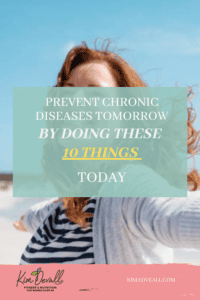- Post author:Kim Devall
- Post published:June 28, 2020
- Post comments:1 Comment

Before I jump in to the 10 things you can do today to prevent chronic disease, I want to start by talking about HEALTHY LIVING.
Like, what is it? How do you define healthy living? AND, Why is it important to talk about?
You may define HEALTHY LIVING slightly different from me and that’s ok.
In this post, I’ll share some things for you to consider as you create your own definition.
Then, I’ll dive into changes you may wish to make to create a healthier lifestyle and hopefully prevent chronic disease in the future.
New here? Thanks for stopping by or welcome back. After you read this blog, be sure to check out some of my other articles for women over 50 who want to lose body fat, build muscle, create phenomenal bodies they love.
What is it about the word “healthy” that has women running the other direction or changing the subject?
Well, in all seriousness, I actually do get it. Our health and the choices we make are very personal. And, if we feel we might not be living as healthy a life as we think we “should”, it makes us uncomfortable.
I will share tips on how you can live a healthier lifestyle. The choice is always yours. I’m not here to judge the choices you make.
What is healthy living?
Google the word “health” and you may be surprised to find that there isn’t one clear definition.
World Health Organization defines “health” as a state of complete physical, mental and social well-being and not merely the absence of disease or infirmity.
So then, what is healthy living? The definition I found on The Spiritual Life website resonated with me so I’m sharing it here. “Healthy Living is the steps, actions and strategies one puts in place to achieve optimum health.”
Then, in short, we could say Healthy living is taking steps and actions for overall wellbeing free of disease.
Per the CDC, 6 out of 10 Americans live with at least one chronic disease (4 out of 10 live with two or more), such as heart disease, cancer, or diabetes. Most chronic diseases (defined as diseases lasting more than a year that require ongoing medical care and/or limit daily activities) can be prevented through healthy nutrition, exercise, avoiding excessive drinking or not smoking.
And, who wouldn’t want to prevent chronic disease, right? But, how do we do it?
What actions can you take to prevent chronic disease?
The actions or steps I’m about to share probabably aren’t going to be a big surprise. They also aren’t a “cure” for disease and can’t guarantee you will remain free of any chronic diseases.
However, each of these helps reduce the risk of chronic disease.
Unfortunately, there are many things in life that we don’t have control over. We do have control over whether we take actions to reduce our risk or not. I hope you will choose to take at least some of the following actions.
Increase Physical Activity
Regular physical activity can reduce your risks, help manage, delay or prevent chronic disease.
Physical activity can be anything from brisk walking, biking, swimming, strength training, dancing, or gardening.
Ideally, the aim should be a minimum of 150 minutes of activity per week. I like to aim for a minimum of 30 minutes per day at least 5 days a week. That’s my personal choice. What works for you may be different.
The type of activity you choose is less important than picking something you enjoy. If you’re just getting started or trying to find a way to add more physical activity, walking is a great place to start.

Eat Healthy

You don’t need to completely overhaul your diet/nutrition over night. As a matter of fact, you’ll be more likely to stick to it if you make small changes slowly. Even a 5% weight loss (if weight loss is your goal) can help delay or prevent chronic diseases, like diabetes.
Ultimately, a diet filled with lean protein, fruits and vegetables, whole grains and healthy fats is recommended.
Grab a copy of my Step-by-step guide to meal planning with macros to get some ideas. It’s a free resource so I hope you take advantage of it.
Get at Least 7 Hours Sleep
Sleep. We often take it for granted. Think you function just fine on 5 hours? What about the impact lack of sleep can have on your ability to prevent future chronic disesase?
Not getting enough sleep hinders our ability to make good food choices. Ever notice uncontrollable urges for carbs?
Could be related to lack of sleep. I know for a fact on nights I don’t get quality sleep, I better hide the carbs!!
Inadequate sleep has been linked to obesity, heart disease, depression and difficulty managing diabetes.
If you aren’t getting at least 7 hours of sleep, start by trying to get an extra 5 – 10 minutes.
Getting more sleep COULD literally save your life.

Manage your stress to prevent chronic disease
Stress is thought to be a risk factor for heart disease. More research is needed to determine exactly how stress impacts heart disease.
Does stress directly contribute to heart disease OR does stress make us more likely to follow other behaviors such as poor eating habits, physical inactivity and smoking, which contribute to heart disease?
Either way, managing your stress is a good idea.

Although you might not want to meditate in the middle of a work meeting, meditation is an excellent way to reduce stress.
Some other ideas you may want to consider:
- Journaling
- Taking some deep breaths
- Quiet walks
- Reading a book
Maintain a positive mindset
Not that thinking positive thoughts by themselves can prevent chronic disease, but negative thoughts sure aren’t doing you any favors.
At this time, there isn’t a clear understanding as to why a positive mindset is correlated to health benefits. Researchers continue to explore.
It is believed that positive thoughts may result in several health benefits, including:
- increased life span
- better cardiovascular heatlh
- lower rates of depression
Here are some things that can help create a more positive mindset.
- Identify those moments when you’re having negative self talk
- Surround yourself with positive people
- Be open to humor and laughter
- Follow a healthy lifestyle (yep, it’s one of those – which comes first – the healthy lifestyle or the positive mindset?)

Socializing with friends and family
Make it a priority to spend time with friends and family. Whether it’s laughing or sharing what’s on your mind, research shows that this is a critical component to healthy living.

Women with a strong sense of community tend to live longer and feel happier. There is also thought and some evidence that social isolation can be even more detrimental to your health than obesity, or smoking.
10 things you can do TODAY to prevent chronic disease TOMORROW
- Add one more serving of fruits and/or vegetables per day
- Go for a 10 minute brisk walk
- Start tracking your steps per day. Work up to 10k per day.
- Get 10 more minutes of sleep tonight
- Check your blood pressure. Consult your doctor, as neeed.
- Meditate for 5 minutes
- Turn one negative thought into a positive one (ex. I’m never going to be good at this.——-> I know I can do this. I’ll keep practicing until I get better.)
- Laugh – at a mistake you made, a funny story, for no reason at all
- Call a friend to catch up
- Grab a copy of my FREE Step-by-Step Guide to Meal Planning with Macros.
These 10 actions may not prevent chronic disease by themselves. They are a step in the right direction and could lower your risk of disease.
Be sure to consult your physician before starting an exercise program or making significant changes to your diet.
Join our Facebook community.
Pin it now. Read it later.


